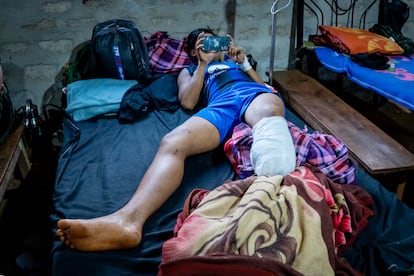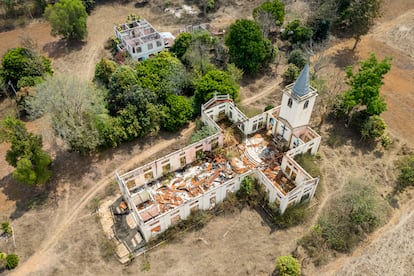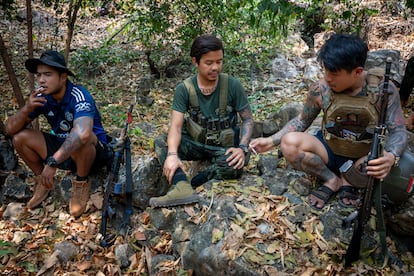"We built an underground operating room for the most critical patients": the army besieges hospitals and schools despite the end of the state of emergency in Myanmar.

A little girl lies on a stretcher, her leg wrapped in blood-soaked bandages. Her mother, beside her, holds her hand tightly. “My daughter was playing when she was suddenly struck by a fragment of a bomb dropped from a drone,” she says softly. In a nearby bed is nine-year-old Zi Ya Tee. A mortar fragment pierced her shin when she was at home with her family. The small hospital housing these two little girls is tucked away in the jungle near the village of Demoso, in Karenni State—now officially known as Kayah State—in eastern Myanmar . It is at the heart of the civil war that has ravaged the Southeast Asian country since the February 2021 coup that left Myanmar in the hands of the military junta.
Attacks against hospitals, schools, and churches in Myanmar continue, despite the fact that the junta lifted the state of emergency on July 31 and announced staggered elections between December 2025 and January 2026. Last Saturday, at least 19 high school students were killed in a bombing ordered by the military junta in Rakhine State, in which 227 kilos of explosives were used, according to a statement issued by the opposition Arakan National League for Democracy and the Arakan Army on September 13. International observers and the opposition, which has announced it will boycott the elections, believe they are a mere facade and that General Min Aung Hlaing, who led the coup, will remain president or head of the army after the elections.
According to Human Rights Watch, since the 2021 coup, military forces have launched repeated attacks on hospitals , medical professionals, and facilities, severely weakening emergency response capacity. During this time, at least 263 health facilities have been attacked and 74 health workers have died.
While elections are being discussed in the capital, Naypyidaw, a group of doctors continues to treat the wounded in this clinic hidden in the jungle. The hospital has narrow corridors lit by lamps powered by a generator that constantly breaks down. The smell of disinfectant mingles with that of blood and smoke, carried by the wind, penetrating the plastic sheets protecting the windows.
One of those treating the wounded at the clandestine clinic is Juri Au Mi Mint, a young man who has been forced to grow up too early. He wears a black T-shirt, shorts, and flip-flops. He arrived from Yangon in April 2021, shortly after the coup. He was studying medicine at the time. “At first, I wanted to take up arms and fight the junta,” he recalls. “But then I realized there was a need for doctors and places to treat the wounded, so I decided to resist in another way.”
At least 80,000 people , both civilians and combatants, have lost their lives since the fighting began, according to estimates by the Armed Conflict Location and Event Data Project (ACLED), an independent organization that monitors and analyzes conflicts around the world. In the last year alone, according to a report just released by the United Nations, operations by the Tatmadaw, Myanmar's armed forces, have resulted in "widespread and systematic human rights violations amounting to war crimes." The report, prepared by the Independent Investigative Mechanism for Myanmar (IIMM) , presents accounts of torture (electric shocks, strangulation, and mutilation), sexual violence, summary executions, and attacks on schools, hospitals, homes, and places of worship.
The United Nations High Commissioner for Refugees (UNHCR) estimates that nearly 3.5 million people have been forced to flee their homes. According to UNICEF, 19.9 million people , about 35% of the country's population, are in urgent need of humanitarian assistance, including 6.4 million children. Meanwhile, the economy is collapsing, and the World Bank estimates that nearly half the population lives below the poverty line .

The room where Juri speaks, the same one where dozens of wounded arrive every day, has the basics: metal beds, a few surgical instruments carefully arranged on a table, and a slowly rotating plastic fan.
In May 2021, Juri founded her first clinic with other doctors east of Demoso. But in November 2023, it suffered several airstrikes. Several nurses were injured, and a young volunteer lost a leg. “We had to close the hospital and rebuilt it here, in a more secluded location,” she explains. “In these facilities, we perform around 50 operations a day and can accommodate up to 120 people.”
However, being in the heart of the jungle hasn't protected them from attacks either. The army, weakened by battlefield defeats , has intensified air raids and drone and mortar attacks, which have also hit this hospital. "Last month, planes bombed the area seven or eight times," he says. "We built an underground operating room for the most critical patients."
In these facilities we perform around 50 operations a day and can accommodate up to 120 people.
Juri Au Mi Mint, physician
They've dug a concrete tunnel that descends several meters, with a ramp for stretchers to slide through. At the end, there's a brown double door. When you open it, several doctors and nurses appear, leaning over operating tables, covered in masks and gloves. "We have several urgent cases right now," Juri says briefly, so as not to distract the staff.
Churches bombed and converted into schoolsIn the township of Pekon, north of Demoso, a wood and bamboo church has been converted into a school. The pews are worn planks, and the walls are riddled with shrapnel. The children repeat aloud what the teacher reads to them. But they have to stop because of the roar of the planes. “They’ve already bombed us,” says the principal, Tein Shu Miyan. “Every day we hold drills. The children learn to take shelter in the trenches we’ve dug. It’s dangerous, but we can’t give up on education. Young people are the future of our country.”

In addition to schools, religious buildings have also been attacked. In a village near Pekon, mass is still being celebrated. The church is full. Nuns sit in the front pews. They ask that no photos be taken outside, for fear of identifying the site. The army has attacked approximately 40 such buildings since the war began.
“The only thing we have left is faith. No one can take that away from us,” says a nun who attends Mass and, for security reasons, prefers to remain anonymous. “The population is suffering terrible problems. There is a lack of food, education, and healthcare. But we want to maintain a positive attitude. With God's help, all this will pass.”
Children are learning to take refuge in the trenches we've dug. It's dangerous, but we can't give up on education.
Tein Shu Miyan, school principal
According to the World Food Programme (WFP), around 15.2 million people in Myanmar do not have enough food and at least 2.3 million are suffering from hunger at levels that can be described as emergency. The lack of funding has forced the WFP to cut food aid to more than one million people in the country. “These cuts are occurring precisely at a time when conflict, displacement, and restrictions make food aid more necessary than ever,” said Michael Dunford, the organization’s regional director for Asia and the Pacific, last March.

Meanwhile, hidden in the jungle, more than 380 boys and girls are training at a camp run by the Karenni National Defense Force (KNDF) and the Karenni Army (KA). “The training lasts three months. First it’s physical, then they move on to weapons, and finally, they go to the front,” explains Stephen, the training leader, as he watches the young people march past. “They all came voluntarily because they want to live in a free country, not a dictatorship. We are fighting for a better future and a federal system where all ethnic groups can live in peace.”
“We can't accept a military dictatorship,” says Dr. Juri. “My dream is to oust the junta and become a surgeon to work in a free country. I sincerely hope to achieve that,” he adds before being called away for another emergency. Then he runs to the operating room, where the war continues to knock on the double brown doors.
EL PAÍS





